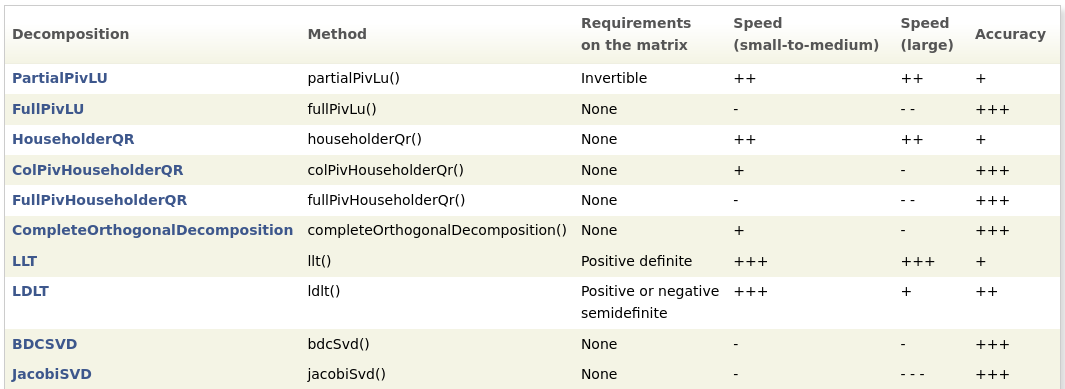代码笔记2 eigen库的实践1
1 环境
系统 Ubuntu1804,版本 gcc/g++ 7, IDE Vscode(你也可以不把vscode当IDE哈哈哈,其实比较想用KDEVELOP,但是本人喜欢黑色界面,kdevelope属实差点意思),eigen3
2 代码展示
也是在学高博的SLAM十四讲,不过许多东西高博也没有细讲。
cmakelist.txt
cmake_minimum_required(VERSION 2.8)
project(useEigen)
set(CMAKE_BUILD_TYPE "Debug")
set(CMAKE_CXX_FLAGS "-O3")
# 添加Eigen头文件
include_directories("/usr/include/eigen3")
add_executable(eigenMatrix eigenMatrix.cpp)
include_directories("/usr/include/eigen3")
add_executable(myeigenlearn myeigenlearn.cpp)
说点奇怪的,就是即使cmakelist添加了头文件的路径,vscode仍然会标红,但好像运行不报错。但我我看了很难受,就根据[1]建议的建立了软连接。
myeigenlearn.cpp
#include <iostream>
using namespace std;
#include <ctime>
#include <Eigen/Core>
#include <Eigen/Dense>
#include <Eigen/Cholesky>
#include <Eigen/LU>
#include <Eigen/QR>
#include <Eigen/SVD>
using namespace Eigen;
int main(int argc, char **argv)
{
Matrix<float, 3, 3> matrix_33;
matrix_33 << 1,2,3,4,5,6,7,8,9;
cout<< matrix_33<<endl;
cout<<matrix_33.transpose()<<endl;
Vector3d v3d;
v3d<<1,2,3;
Matrix<double,3,1> output = matrix_33.cast<double>()*v3d;
cout<< "output = "<< output<<endl;
Matrix<double,10,10> randommatrix = MatrixXd::Random(10,10);
randommatrix = randommatrix.transpose()*randommatrix;
cout<< "random = \n"<<randommatrix<<endl;
Matrix<double,10,1> v10d = MatrixXd::Random(10,1);
cout<<"v10d = \n"<<v10d<<endl;
//x = randommatrix**(-1)*v10d
Matrix<double,Dynamic,Dynamic> x5;
clock_t time_stt = clock();
Matrix<double,10,1> x1,x2,x3,x4,x6;
x1 = randommatrix.ldlt().solve(v10d);
cout << "time of x1 decomposition is "
<< 1000 * (clock() - time_stt) / (double) CLOCKS_PER_SEC << "ms" << endl;
cout<<"x1= \n"<<x1.transpose()<<endl;
time_stt = clock();
x2 = randommatrix.llt().solve(v10d);
cout << "time of x2 decomposition is "
<< 1000 * (clock() - time_stt) / (double) CLOCKS_PER_SEC << "ms" << endl;
cout<<"x2= \n"<<x2.transpose()<<endl;
time_stt = clock();
x3 = randommatrix.lu().solve(v10d);
cout << "time of x3 decomposition is "
<< 1000 * (clock() - time_stt) / (double) CLOCKS_PER_SEC << "ms" << endl;
cout<<"x3= \n"<<x3.transpose()<<endl;
time_stt = clock();
x4 = randommatrix.colPivHouseholderQr().solve(v10d);
cout << "time of x4 decomposition is "
<< 1000 * (clock() - time_stt) / (double) CLOCKS_PER_SEC << "ms" << endl;
cout<<"x4= \n"<<x4.transpose()<<endl;
time_stt = clock();
x5 = randommatrix.inverse()*v10d;
cout << "time of x5 decomposition is "
<< 1000 * (clock() - time_stt) / (double) CLOCKS_PER_SEC << "ms" << endl;
cout<<"x5= \n"<<x5.transpose()<<endl;
return 0;
}
主要是一些基本功能的应用,并实现了利用已有的函数进行了线性方程的求解,以及各个方法所需要的实现。但我没学会怎么用函数bscSVD()和jacobiSVD()来求解。希望以后还能拓展吧。
time of x1 decomposition is 0.014ms
x1=
-6.38902 -9.03016 -5.13948 8.55177 4.72832 8.1699 0.999135 7.72978 -5.40814 0.592483
time of x2 decomposition is 0.004ms
x2=
-6.38902 -9.03016 -5.13948 8.55177 4.72832 8.1699 0.999135 7.72978 -5.40814 0.592483
time of x3 decomposition is 0.005ms
x3=
-6.38902 -9.03016 -5.13948 8.55177 4.72832 8.1699 0.999135 7.72978 -5.40814 0.592483
time of x4 decomposition is 0.009ms
x4=
-6.38902 -9.03016 -5.13948 8.55177 4.72832 8.1699 0.999135 7.72978 -5.40814 0.592483
time of x5 decomposition is 0.009ms
x5=
-6.38902 -9.03016 -5.13948 8.55177 4.72832 8.1699 0.999135 7.72978 -5.40814 0.592483
不过这个速度也不是特别稳定,可能是我的矩阵规格本身不大。
根据eigen库本身的文档说明[2]所示,有这么些方法可以用作解线性方程

以后有困难了细读这个网址
还有一个将matlab和eigen相对应的,写的也相当不错[3]
References
[1]https://blog.csdn.net/qq_34213260/article/details/107701717?utm_medium=distribute.pc_relevant.none-task-blog-2defaultbaidujs_title~default-0.pc_relevant_default&spm=1001.2101.3001.4242.1&utm_relevant_index=3
[2]http://eigen.tuxfamily.org/dox/group__TutorialLinearAlgebra.html
[3]https://www.cnblogs.com/python27/p/EigenQuickRef.html


